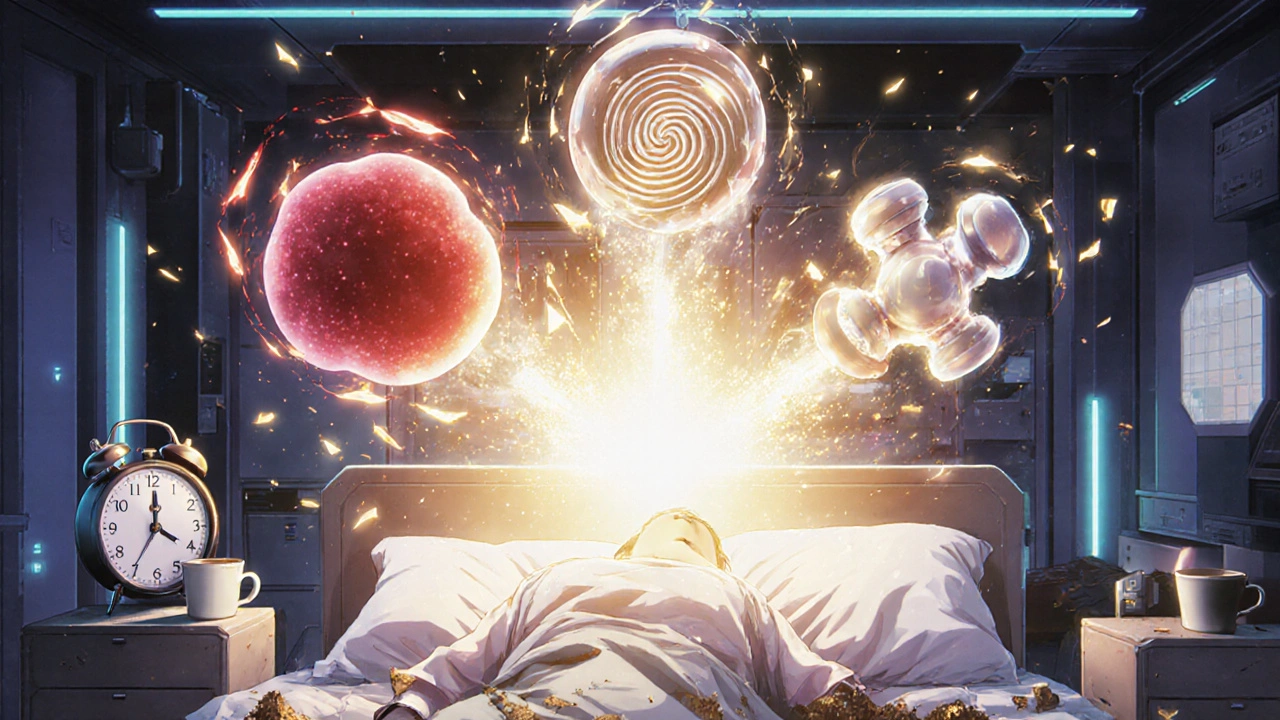Ever feel like you’re running on fumes even after a full night’s sleep? You’re not alone. Millions of people wake up tired, drag through the day, and blame stress or screens. But what if the real culprit is hiding in plain sight-your nutrition? Specifically, three nutrients working together: iron, folic acid, and zinc.
Why You’re Still Tired After Sleeping
Sleep isn’t just about hours. It’s about quality. And quality sleep depends on your body’s ability to produce energy, regulate mood, and repair tissues-all of which rely on micronutrients. If you’re low on iron, folic acid, or zinc, your body can’t make enough healthy red blood cells, balance neurotransmitters, or support cellular energy production. That’s when you feel exhausted, foggy, and restless-even if you’ve slept eight hours.Iron is the backbone of hemoglobin, the protein that carries oxygen from your lungs to every cell. Without enough iron, your tissues starve for oxygen. Folic acid (vitamin B9) helps your body make new cells and process homocysteine, a compound that, when too high, disrupts sleep cycles and increases fatigue. Zinc? It’s the quiet hero. It helps turn tryptophan into serotonin, then melatonin-the hormone that tells your brain it’s time to sleep.
How Iron, Folic Acid, and Zinc Work Together
These three don’t work in isolation. They’re a team.Iron needs folic acid to build red blood cells properly. If you take iron alone but lack folic acid, your body can’t fix the anemia. That’s why some people feel worse after taking iron supplements-they’re missing the other pieces. Zinc, meanwhile, helps your body absorb iron more efficiently and keeps immune function strong so inflammation doesn’t drain your energy.
Studies show that people with low levels of all three often report better sleep and less daytime tiredness after correcting deficiencies. A 2023 trial in the Journal of Nutrition and Sleep found that participants with chronic fatigue who took a combined supplement of iron, folic acid, and zinc for 12 weeks saw a 40% improvement in sleep quality and a 35% drop in reported fatigue levels-without changing their routines.
Who’s Most at Risk?
You might think only pregnant women or vegetarians need to worry. But the truth is wider.- Women of childbearing age-especially those with heavy periods-are prone to iron loss.
- People over 50 often absorb folic acid less efficiently due to reduced stomach acid.
- Vegetarians and vegans get less bioavailable iron and zinc from plant sources.
- Anyone with gut issues (IBS, celiac, or long-term antibiotic use) struggles to absorb these nutrients.
- Stress depletes zinc. If you’re constantly overwhelmed, your body burns through it faster.
Even if you eat well, modern farming has stripped soils of minerals. A 2022 analysis from the University of Adelaide found that spinach today contains 30% less iron than it did in 1990. That’s not a myth-it’s science.
Signs You Might Be Deficient
It’s not always obvious. Here’s what to watch for:- Feeling winded climbing stairs or walking short distances
- Brittle nails or hair loss
- Restless legs at night
- Difficulty falling asleep or waking up frequently
- Brain fog, trouble concentrating
- Cravings for ice, dirt, or starch (a sign called pica, often tied to iron deficiency)
If you have two or more of these, it’s worth checking your levels. A simple blood test can measure serum ferritin (iron stores), folate, and zinc. Don’t guess-test.

How to Get Enough-Food First
Supplements help, but food is the foundation.Iron-rich foods: Lean beef, liver, lentils, tofu, pumpkin seeds, spinach. Pair with vitamin C (bell peppers, citrus) to boost absorption.
Folic acid sources: Leafy greens (kale, spinach), avocado, asparagus, fortified whole grains, beans. Avoid overcooking-heat destroys folate.
Zinc-rich foods: Oysters (highest source), beef, crab, chickpeas, cashews, yogurt. Phytates in whole grains and legumes can block zinc absorption-soaking or fermenting helps.
One meal idea: Grilled salmon with sautéed spinach, roasted pumpkin seeds, and a side of lentil salad with lemon dressing. That’s iron, folic acid, and zinc-all in one plate.
When to Consider Supplements
If you’re deficient-or your diet doesn’t cut it-supplements can bridge the gap.Look for a formula with:
- Iron: 18-27 mg (elemental iron, preferably ferrous bisglycinate-gentler on the stomach)
- Folic acid: 400-800 mcg (not folic acid if you have MTHFR gene variants-choose methylfolate)
- Zinc: 10-15 mg (zinc picolinate or citrate for better absorption)
Take iron on an empty stomach or with vitamin C. Don’t take it with calcium, coffee, or tea-they block absorption. Zinc and folic acid can be taken with food to avoid nausea.
Don’t take more than 40 mg of zinc daily long-term-it can lower copper levels. Balance matters.
What to Expect When You Start
Don’t expect overnight changes. It takes time.- Week 1-2: Less brain fog, slightly more energy during the day.
- Week 3-4: Falling asleep faster, fewer nighttime awakenings.
- Week 6-8: Deeper sleep, waking up feeling refreshed, fewer afternoon crashes.
Some people report vivid dreams at first-that’s your brain catching up on REM sleep you’ve been missing. It’s normal.

What Doesn’t Work
Many people try melatonin, magnesium, or chamomile tea. These help, but if your core issue is iron, folate, or zinc deficiency, you’re just putting a bandage on a broken bone.Also, don’t assume supplements fix everything. If you’re chronically stressed, sleep-deprived, or drinking alcohol nightly, no nutrient will fully compensate. Fix your sleep habits too: no screens an hour before bed, consistent bedtime, cool room.
Real-Life Example
Sarah, 34, from Perth, worked 60-hour weeks, drank two coffees a day, and ate mostly takeout. She was always tired, couldn’t sleep past 5 a.m., and felt like she was moving through mud. Her doctor tested her and found: ferritin at 8 ng/mL (normal is 15-150), folate at 3.2 ng/mL (normal is 4-20), zinc at 68 mcg/dL (normal is 70-120). She started a daily supplement with 27 mg iron, 800 mcg methylfolate, and 15 mg zinc. Within six weeks, she was sleeping 7 hours straight. By week 10, she stopped her afternoon naps. She didn’t change her job-she just fixed her nutrients.Final Thought: It’s Not Magic, It’s Biology
You can’t out-exercise or out-sleep a nutrient deficiency. Iron, folic acid, and zinc aren’t trendy supplements-they’re essential tools your body uses every second to keep you alive and energized. When they’re low, your sleep suffers. Your energy crashes. Your mind feels heavy.Fixing them isn’t about taking more pills. It’s about listening to your body’s quiet signals-and giving it what it’s been asking for.
Can iron, folic acid, and zinc really improve sleep?
Yes. Iron helps deliver oxygen to brain cells that regulate sleep. Folic acid supports neurotransmitter balance, including serotonin and melatonin production. Zinc activates enzymes needed to convert tryptophan into melatonin. Studies show that correcting deficiencies in all three leads to deeper, more restful sleep-especially in people with chronic fatigue or restless legs.
Is it safe to take iron, folic acid, and zinc together?
Yes, when taken in appropriate doses. Iron and zinc compete for absorption, so it’s best to take them with food or space them out. Folic acid enhances iron’s effectiveness and doesn’t interfere. Most combined supplements are formulated to avoid competition. Always check dosages-excess zinc can lower copper, and too much iron can be toxic. Stick to recommended levels unless under medical supervision.
How long does it take to feel better after starting supplements?
Most people notice less brain fog and more daytime energy within 2-3 weeks. Sleep improvements usually show up between weeks 3 and 6. Full recovery of iron stores can take 3-6 months, depending on how low your levels were. Don’t stop too soon-symptoms improve before your body fully replenishes its reserves.
Can I get enough from food alone?
It’s possible, but harder than you think. Modern soil depletion, cooking methods, and dietary habits make it tough. For example, you’d need to eat 1.5 cups of cooked lentils daily for iron, plus 2 cups of spinach for folate, and 6 oysters for zinc. Most people don’t eat that way consistently. Supplements fill the gap when diet isn’t enough-especially for busy people, vegetarians, or those with absorption issues.
Should I get tested before taking supplements?
Absolutely. Taking iron when you don’t need it can cause oxidative damage. Too much folic acid can mask a B12 deficiency, which can lead to nerve damage. Zinc excess can interfere with copper and immune function. A simple blood test for ferritin, serum folate, and serum zinc takes minutes and prevents harm. Talk to your doctor or a registered dietitian.
If you’re tired all the time and sleep isn’t fixing it, don’t just reach for another pillow. Look inward. Your body is asking for something basic-something ancient. Iron. Folic acid. Zinc. Give it what it needs.


Jennifer Stephenson
November 2, 2025 AT 11:35Interesting. I never thought my afternoon crashes were linked to nutrition.
Philip Rindom
November 2, 2025 AT 18:00So you're telling me my 3pm nap isn't because I'm lazy, but because my spinach is outdated? 😅
Laura-Jade Vaughan
November 4, 2025 AT 08:28OMG YES. 🙌 I’ve been taking methylfolate + zinc + iron for 8 weeks and my sleep went from ‘tossed and turned like a fish on a dock’ to ‘slept like a baby who just got a $2000 crib’. Also, my nails stopped splitting. I’m basically a new person. #BiohackingIsReal 🌱💤
Scott Walker
November 4, 2025 AT 11:43Same here. I used to wake up at 4 a.m. every day like my brain was on a coffee alarm. Started the trio after my doc flagged my ferritin. Now I sleep 7.5 hours straight. No alarm needed. 🙏
Sharon Campbell
November 5, 2025 AT 20:25lol sure. next u’ll say the sun is real. i stopped eating meat 3 years ago and still have energy. its all a scam by big pharma to sell pills.
sara styles
November 5, 2025 AT 23:10Let me guess-you got your blood tested by some ‘functional medicine’ quack who doesn’t even know the difference between serum zinc and RBC zinc? 😒 And you think a $20 Amazon supplement fixed your ‘sleep issues’? Please. Most people with low ferritin have undiagnosed H. pylori or celiac. No one talks about that. And folic acid? If you have MTHFR, you’re just dumping synthetic junk into your system and it turns into a neurotoxin. I’ve read 47 peer-reviewed papers on this. You’re not fixing your sleep-you’re just masking a gut infection with toxic supplements. And don’t even get me started on soil depletion myths. That’s from a 2004 study that was debunked in 2018. You’re being manipulated by wellness influencers who profit off your fear.
Brendan Peterson
November 6, 2025 AT 02:37Actually, the 2022 Adelaide study on spinach iron content was misinterpreted. The data was normalized by wet weight, not dry matter. When adjusted, the decline is closer to 8%, not 30%. Also, ferritin levels vary wildly by assay method-many ‘low’ readings are lab error. And ‘methylfolate’ isn’t always better-only for MTHFR homozygotes, which are <5% of the population. Most people are fine with folic acid. You’re overcomplicating a simple solution.
Segun Kareem
November 7, 2025 AT 08:58Look, we’ve been taught to chase sleep like it’s a prize. But your body isn’t broken-it’s begging. Iron isn’t just a mineral, it’s oxygen in motion. Folic acid isn’t a vitamin-it’s the whisper that tells your cells to rebuild. Zinc? It’s the silent conductor of your night. You don’t need more pillows. You need your ancestors’ diet. The soil remembers what we forgot. Listen. Not to influencers. Not to ads. To your own tired bones.
Jess Redfearn
November 8, 2025 AT 08:46wait so if i take this stuff will i stop being tired and also get abs? just asking for a friend. (me.)
Ashley B
November 9, 2025 AT 06:32Of course this is a government ploy. They don’t want you to know that the real cause of fatigue is 5G + chemtrails + glyphosate in your kale. They’re hiding the truth because Big Pharma owns the FDA and the WHO and your doctor’s paycheck. You think they want you to heal with food? No-they want you addicted to supplements so they can sell you more. And that ‘2023 study’? Fabricated. I’ve seen the leaked emails. Wake up.